Introduction
In a world where well-being often takes a backseat to daily demands, understanding hormonal health has never been more crucial. The phenomenon of hormonal belly—a condition marked by excess abdominal fat linked to hormonal imbalances—affects countless individuals, particularly during pivotal life stages such as menopause and pregnancy.
Factors such as:
- stress
- poor nutrition
- sedentary lifestyles
exacerbate this issue, creating a cycle that can feel overwhelming.
However, by exploring effective strategies for managing hormonal health, individuals can reclaim control over their bodies and enhance their overall quality of life. From dietary adjustments and exercise to stress management techniques, this article delves into actionable insights that empower individuals to foster a healthier relationship with their hormones, paving the way for transformative change in both personal and workplace environments.
What is Hormonal Belly and How Does It Develop?
Hormonal belly treatment is essential for addressing the accumulation of excess fat around the abdominal area, which is closely tied to hormonal imbalances that can arise from various life stages, including menopause, pregnancy, and significant weight fluctuations. Factors contributing to this condition include tension, inadequate nutrition, and sedentary lifestyles. Key hormones involved in this process include cortisol, estrogen, and insulin.
Notably, elevated cortisol levels, often a result of chronic stress, have been shown to promote fat retention in the abdominal region. Furthermore, research indicates a positive correlation between BMI and TSH levels, particularly pronounced in men, emphasizing the influences on body composition. Additionally, imbalances in estrogen and insulin play critical roles in altering fat distribution.
A pertinent case study titled 'Functional hypothalamic amenorrhoea and polycystic ovarian morphology' illustrates the clinical implications of these imbalances, emphasizing the need for further research to understand their impact on treatment strategies. Recent studies emphasize that only 31% of women feel at ease discussing menopause at work, underscoring the necessity for improved communication and support regarding health. As a powerful insight, one study noted that a higher intake of polyunsaturated fatty acids (PUFAs) was linked to lower testosterone concentrations, suggesting that dietary adjustments may aid in achieving balance in hormone levels.
Comprehending these mechanisms is crucial for effectively managing belly fat with hormonal belly treatment, empowering individuals to take charge of their well-being and fostering a healthier workplace environment.
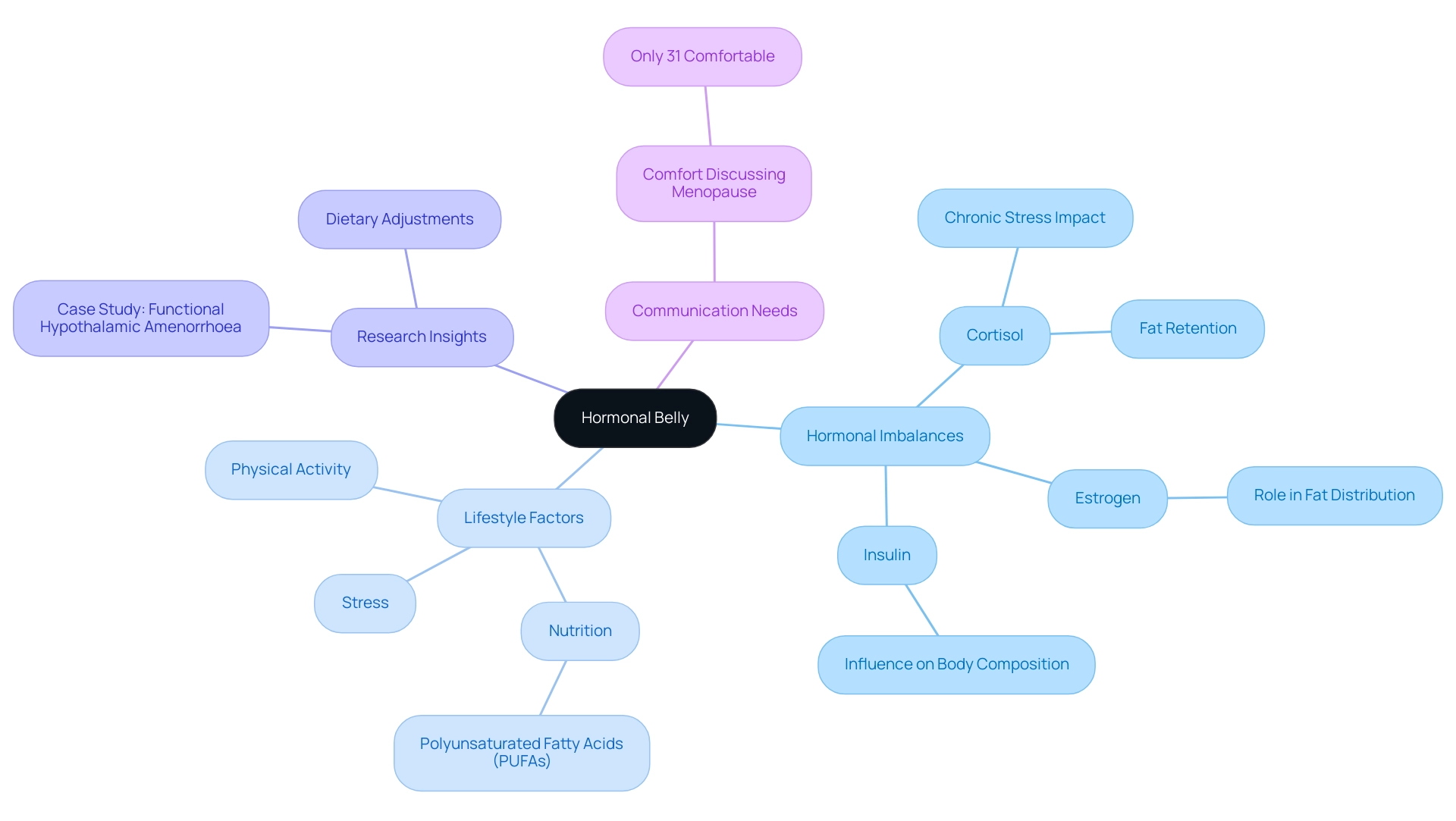
Effective Strategies for Treating Hormonal Belly
To effectively address belly issues and promote overall well-being, consider implementing the following empowering strategies that include hormonal belly treatment with the help of personalized coaching:
-
Dietary Adjustments: Embrace a balanced diet filled with whole foods, lean proteins, healthy fats, and fiber. Restricting sugar and processed foods is essential for hormonal belly treatment, as these can exacerbate imbalances in hormones.
Focus on incorporating omega-3 fatty acids from sources like salmon and walnuts, known for their anti-inflammatory properties. -
Regular Exercise: Commit to a well-rounded exercise regimen that includes both aerobic and strength training activities.
Aim for a minimum of 150 minutes of moderate aerobic exercise each week, supplemented by strength training on two or more days. Regular physical activity not only helps regulate hormones but is also an effective hormonal belly treatment that mitigates stress levels. -
Stress Management: Adopt stress-reduction techniques such as mindfulness, yoga, or meditation.
These practices are essential for lowering cortisol levels, which is vital for maintaining endocrine balance and can be beneficial for hormonal belly treatment. -
Sleep Hygiene: Prioritize quality sleep by establishing a consistent sleep routine, creating a tranquil sleeping environment, and steering clear of screens before bedtime.
Acknowledging that inadequate sleep is associated with endocrine disruptions can aid in preventing weight gain. -
Consult a Healthcare Provider: If lifestyle modifications do not produce the desired results, engaging with a healthcare professional can provide insight into potential medical interventions, including hormonal belly treatment tailored to individual needs.
To address concerns about thyroid function and abdominal weight gain, it is important to maintain a healthy lifestyle and consider hormonal belly treatment. Increased abdominal fat can contribute to the risk of Type 2 diabetes, heart disease, high blood pressure, and stroke, underscoring the urgency of these strategies.
As highlighted by Juha J. Hulmi, consulting with healthcare professionals can provide tailored advice for managing these concerns.
By integrating these strategies and leveraging personalized support, individuals can not only manage belly fat effectively through hormonal belly treatment but also enhance their overall well-being.
As illustrated by the inspiring journey of Cindy Breen, who lost 25 pounds through a holistic approach of dietary changes, regular physical activity, and stress-reducing practices like meditation, these methods can lead to transformative outcomes.
Additionally, client testimonials highlight the effectiveness of personalized coaching:
'Working with my coach helped me understand my body better and make choices that truly fit my lifestyle,' says Sarah, a satisfied client.
Remember, the path to balance in hormones is not just about weight loss; it’s about fostering a healthier, more vibrant life.
Let’s discuss how we can help you thrive in the modern world while learning from the wisdom of the past.
Contact us today to schedule a consultation!
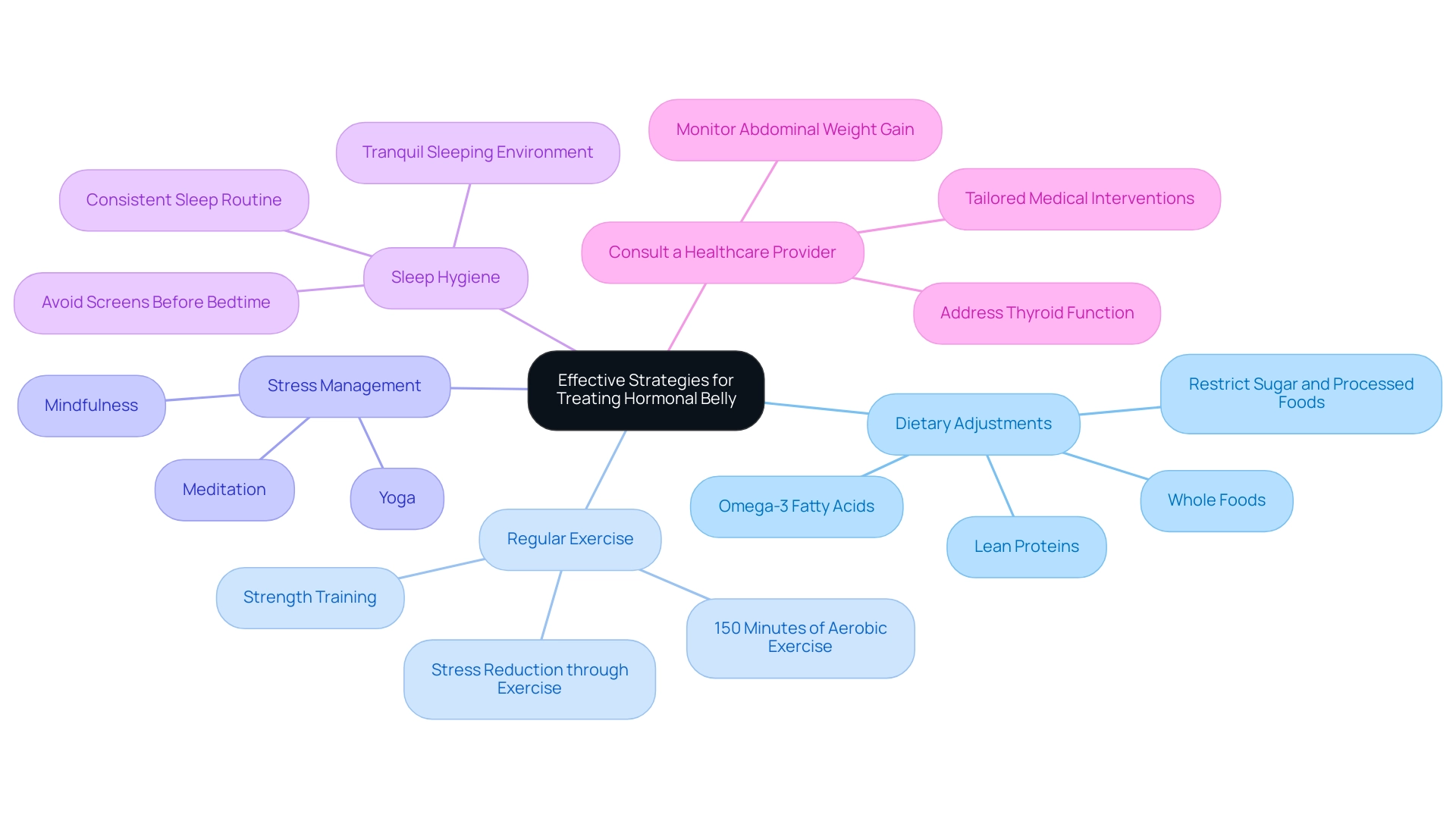
The Role of Nutrition in Hormonal Balance
Nutrition is a powerful ally in the pursuit of balance, and embracing the right dietary components can have a transformative impact. For example, a case study named 'Calorie Deficiencies and Hormonal Imbalances' emphasizes how individuals with eating disorders or restrictive diets may face disruptions due to inadequate calorie consumption, resulting in reduced production of substances and affecting overall well-being. Consider the following key elements:
-
Healthy Fats: Incorporate avocados, olive oil, and nuts into daily meals to bolster hormone production.
Omega-3 fatty acids, especially, play an essential part in decreasing inflammation and promoting overall wellness.
-
Fiber-Rich Foods: Highlighting fruits, vegetables, and whole grains can aid in stabilizing blood sugar levels and enhancing digestive function, both of which are essential for maintaining balance in the body's hormones.
-
Lean Proteins: Incorporating sources such as chicken, fish, legumes, and tofu is vital for maintaining muscle mass and enhancing metabolic function, which are crucial to regulating hormones.
-
Phytoestrogens: Foods like flaxseeds, soy, and legumes can naturally help in balancing estrogen levels, offering a gentle yet effective method for stability.
-
Hydration: Never underestimate the power of hydration! Maintaining proper hydration promotes overall well-being and improves metabolic functions that affect hormone levels.
Moreover, recent research suggests that insulin signaling in the hypothalamus plays a crucial role in managing feeding behavior, which highlights the link between nutrition and bodily well-being. By prioritizing these nutritional strategies, individuals can cultivate a supportive environment for their endocrine balance, thereby facilitating hormonal belly treatment and reducing the risk of imbalances and related challenges such as abdominal weight gain. As highlighted by the Institute for Hormonal Balance, nutritional support is essential for attaining an optimal balance of key substances, ultimately resulting in enhanced health and quality of life.
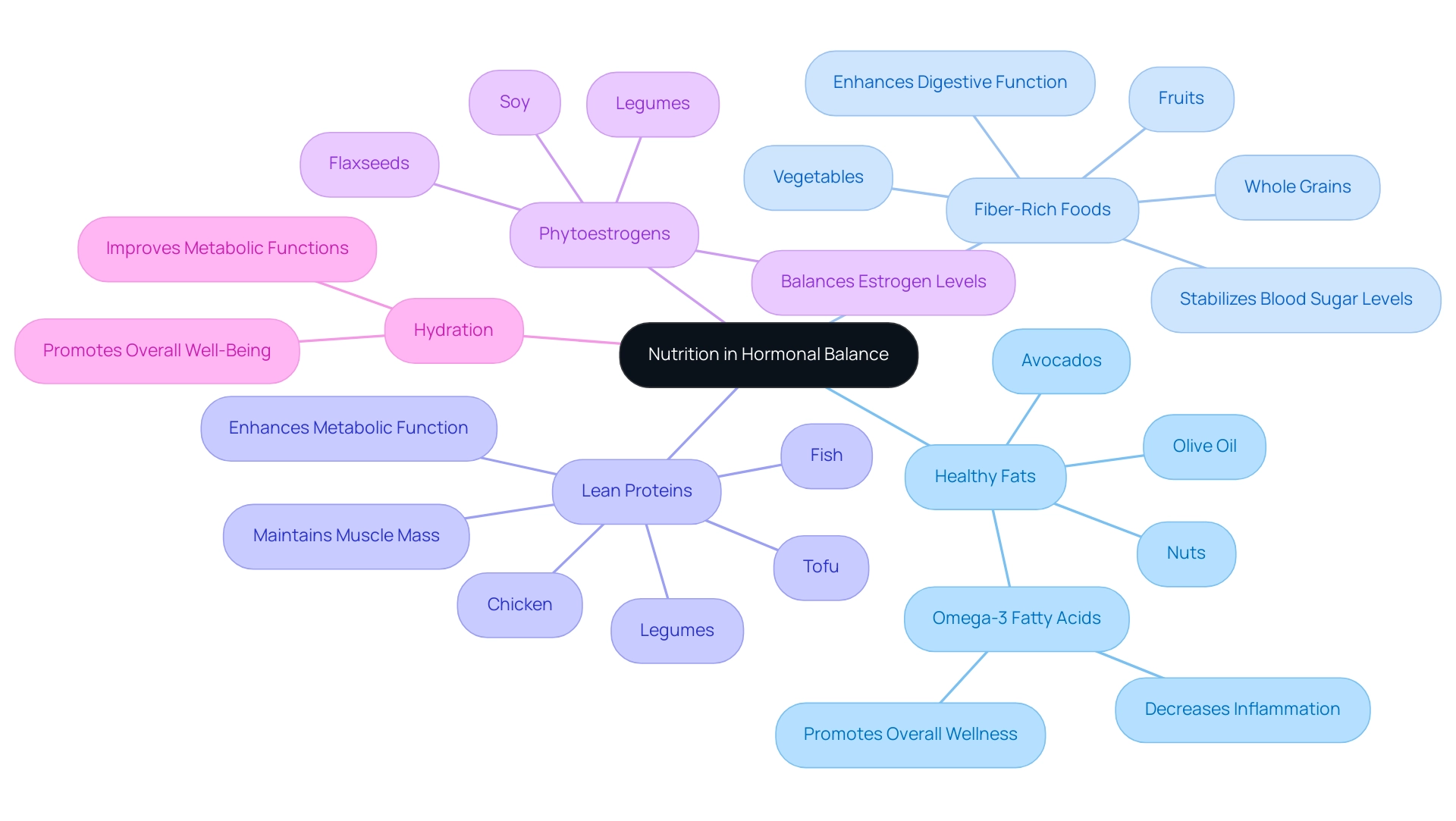
Exercise and Its Impact on Hormonal Health
Regular physical activity is essential for managing body equilibrium, especially when it comes to hormonal belly treatment for combating belly fat. Here’s how exercise profoundly affects chemical levels:
-
Reduces Cortisol: Engaging in moderate to high-intensity exercise has been shown to lower cortisol levels, helping to mitigate stress-related fat accumulation. Notably, a recent study found that 73.5% of peak cortisol responses occurred during the recovery period following exercise, underscoring the importance of timing in exercise routines. According to S Timmerman from the Endocrine Section at the University of North Carolina, 'Exercise not only impacts cortisol levels but also plays a critical role in hormonal belly treatment and overall hormonal regulation.'
-
Boosts Insulin Sensitivity: Exercise significantly enhances the body’s insulin sensitivity, a crucial factor in regulating blood sugar levels and minimizing fat storage. Improved insulin sensitivity not only aids in weight management but also contributes to hormonal belly treatment and promotes overall metabolic health.
- Hormonal Regulation: Activities such as strength training stimulate the release of beneficial substances, including testosterone and growth factors. These substances aid in fat reduction and muscle development, which can be effective in hormonal belly treatment and lead to a healthier body composition.
- Influence of Time of Day: A study conducted on moderately trained young men revealed that while the time of day does not alter the growth hormone response to exercise, it modulates the cortisol response, with the greatest cortisol increase observed at 2400 hours. This finding emphasizes the significance of exercise timing in maximizing benefits related to hormones.
- Cardiovascular Health: Aerobic exercises, like walking, running, or cycling, enhance cardiovascular health and bolster overall metabolic function. Integrating these activities into your routine can lead to significant benefits as a hormonal belly treatment.
To achieve the most effective outcomes, aim for a balanced routine that includes strength training, aerobic exercises, and flexibility work. Consistency is paramount; strive to integrate physical activity into your daily life. By prioritizing exercise, you can enable your team to experience these health benefits, fostering a healthier and more productive workplace.
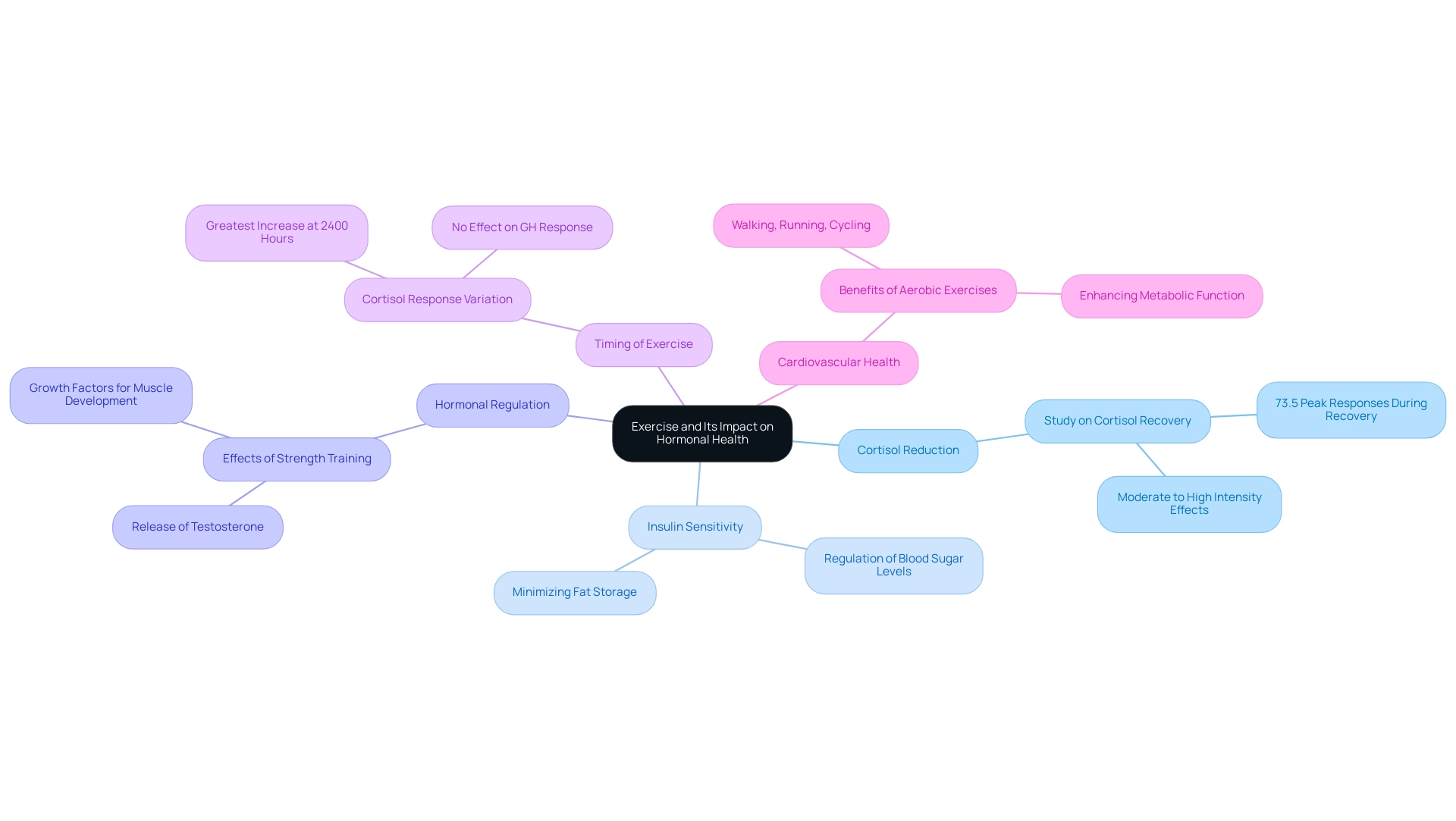
The Importance of Stress Management
Effective pressure management is a cornerstone for maintaining hormonal balance, which is crucial for hormonal belly treatment, and recent research underscores its importance. Notably, a study reported by Statista in 2013 revealed that a significant portion of U.S. adults utilizes effective pressure management techniques, highlighting their relevance in everyday life. Furthermore, mastering pressure management can boost self-confidence and motivation, ultimately enhancing psychological well-being.
Here are some transformative strategies that empower individuals and families to achieve hormonal balance:
-
Mindfulness Practices: Engage in mindfulness meditation or deep-breathing exercises. These practices assist in managing reactions to pressure and have been demonstrated to significantly reduce cortisol levels.
Psychologists highlight mindfulness' crucial importance in decreasing tension and improving overall well-being. As Mariette Kaszkin-Bettag observes, the RCA Actuarial Study emphasizes the cost-efficiency of mindfulness in medical care, reinforcing its significance in managing tension and promoting bodily equilibrium. HR Benefits Managers can incorporate mindfulness workshops into their wellness programs to help employees develop these essential skills.
-
Physical Activity: Regular exercise offers two advantages; it improves physical health and acts as a strong tension reliever. Recent studies illustrate that physical activity can elevate mood and reduce anxiety, contributing to better regulation of hormones and serving as a beneficial aspect of hormonal belly treatment for promoting a confident lifestyle. Implementing group fitness classes or encouraging walking meetings can foster a culture of physical activity in the workplace.
-
Connect with Nature: Spending time outdoors has profound effects on reducing tension. Activities like walking in a park or hiking can elevate mood and foster a sense of peace, further supporting hormonal belly treatment and overall well-being. HR Benefits Managers can organize outdoor team-building activities to encourage employees to connect with nature.
-
Social Support: Cultivating strong relationships with friends and family offers essential emotional support, which can buffer stress. Research shows that social connections lead to enhanced mental well-being and resilience during difficult times, empowering individuals to feel more confident in their lives. Establishing peer support groups within the workplace can enhance social connections among employees.
-
Time Management: Effective organization of tasks and setting achievable goals can alleviate overwhelming feelings. Prioritizing self-care and scheduling relaxation time is crucial for maintaining a balanced lifestyle. HR Benefits Managers can offer training on time management skills to assist employees in handling their workloads more efficiently.
Applying these strategies not only encourages a healthier balance but also results in an improved quality of life for individuals and their families. For instance, a case study from Shahed University illustrated that stress management skills training significantly improved students' academic vitality and psychological well-being, with participants reporting greater awareness of their strengths and weaknesses, ultimately enhancing their educational conditions and mental health. By fostering a culture that embraces these strategies and exploring our company's services, HR Benefits Managers can lead their teams toward a more balanced, confident, and fulfilling life.
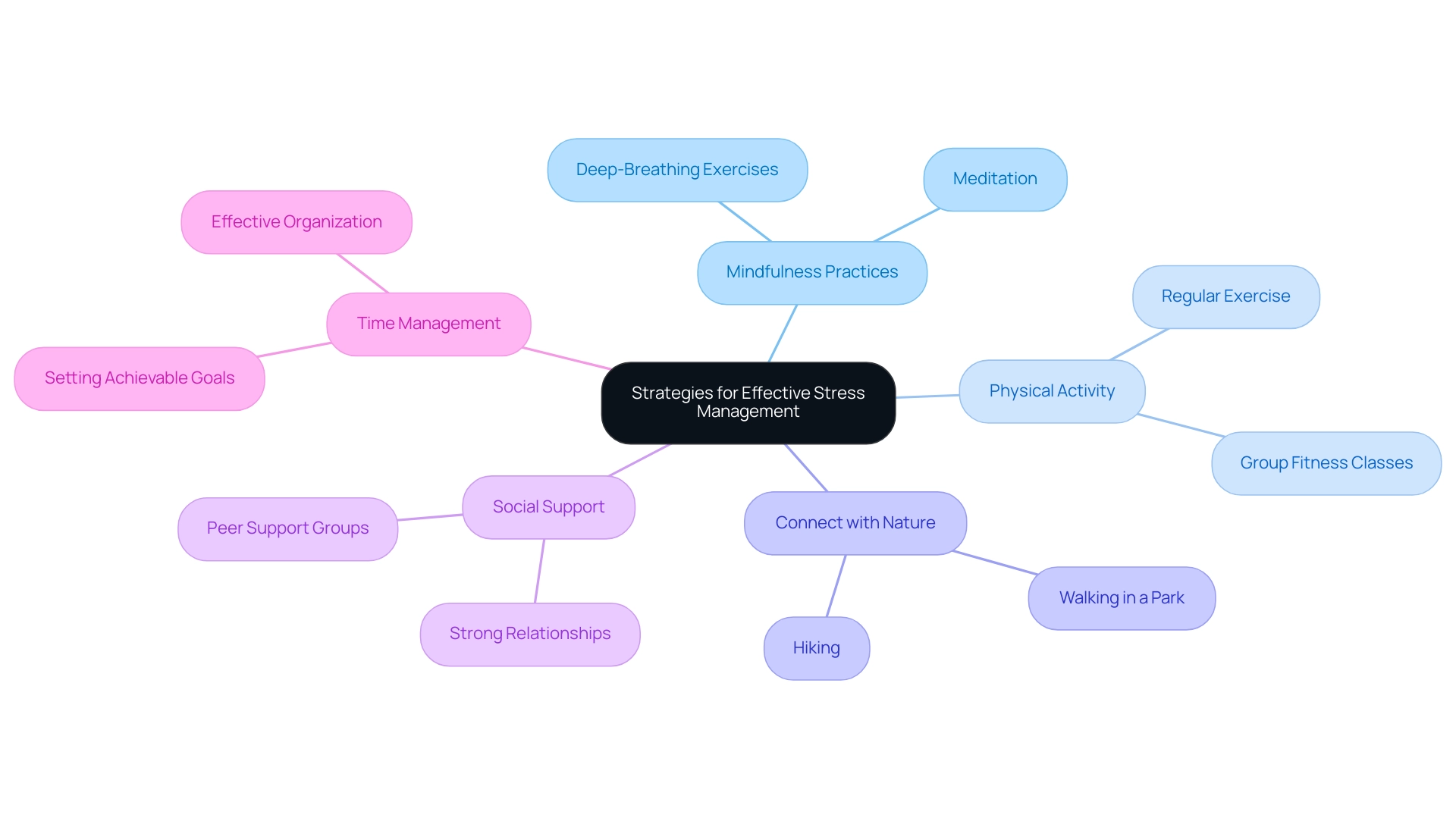
Consulting Healthcare Professionals
When lifestyle modifications fall short in addressing hormonal belly, seeking guidance from a healthcare provider for hormonal belly treatment is crucial. They can conduct specialized assessments and formulate effective treatment strategies, including:
-
Testing: Gaining insight into your hormonal levels is essential for tailoring precise interventions.
Recent findings emphasize that endocrine testing can lead to significant improvements in treatment outcomes.
-
Customized Treatment Plans: Healthcare professionals are adept at designing individualized treatment plans that suit your specific needs, potentially incorporating options like hormone replacement therapy (HRT) or other medications.
Notably, studies show that initiating HRT in women under 60 or within 10 years of menopause can significantly reduce cardiovascular disease (CVD) risk and enhance overall well-being, as demonstrated in the case study titled 'Impact of Hormone Replacement Therapy on Cardiovascular Disease Prevention.' This study highlights that HRT not only lowers the economic burden from menopausal symptoms but also serves as a unique preventive strategy for CVD. Furthermore, statistics indicate that lipid-lowering therapy can reduce CHD, nonfatal MI, and CHD mortality by 20–30% in women, underscoring the importance of effective treatment options.
-
Nutritional Counseling: Working together with licensed dietitians can offer tailored dietary approaches that improve endocrine function, encouraging a balanced lifestyle.
-
Psychological Support: Interacting with mental wellness experts can assist in handling stress, anxiety, and emotional factors that frequently worsen biochemical imbalances.
-
Ongoing Monitoring: Regular check-ins with your healthcare provider are vital to ensure your treatment remains effective and is adjusted as necessary.
Dr. Lauren Streicher, a clinical professor at Northwestern University, remarks,
Hormone therapy is beneficial way beyond the benefits to just helping with hot flashes.
Seeking professional advice not only aids in effectively managing hormonal belly treatment but also promotes long-term wellness benefits, paving the way for a healthier, balanced life. Importantly, shared decision-making and open communication with your healthcare provider are essential components of this process, ensuring that treatment aligns with your personal health goals.
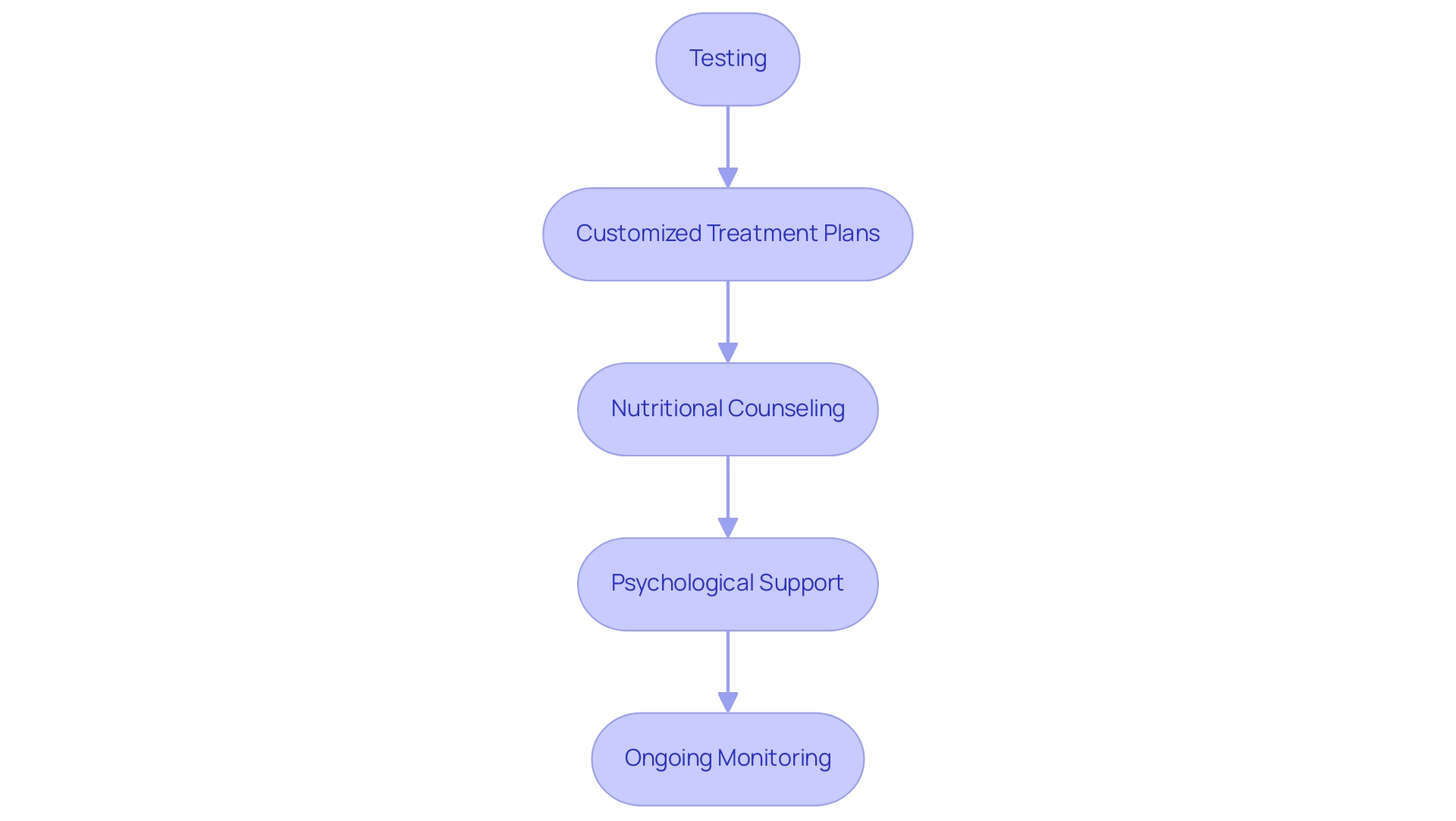
Conclusion
Understanding and addressing hormonal belly is essential for fostering overall well-being, particularly during significant life transitions. By recognizing the critical role hormonal imbalances play in the accumulation of abdominal fat and the various contributing factors such as:
- Stress
- Poor nutrition
- Sedentary lifestyles
Individuals can begin to take proactive steps toward managing their health.
Implementing effective strategies—such as dietary adjustments, regular exercise, stress management techniques, and consulting healthcare professionals—can lead to transformative changes. Emphasizing the importance of a balanced diet rich in healthy fats, fiber, and lean proteins, alongside consistent physical activity and mindful practices, lays the groundwork for achieving hormonal equilibrium. Furthermore, engaging with healthcare providers can offer personalized insights and treatment options that enhance the journey toward better health.
Ultimately, prioritizing hormonal health is not merely about weight loss; it is about empowering individuals to reclaim their vitality and improve their quality of life. By fostering a supportive environment that encourages open discussions about hormonal health and the importance of lifestyle modifications, organizations can create a culture of well-being that benefits both employees and the workplace as a whole. Taking action now can lead to lasting improvements, paving the way for a healthier, more balanced future.




